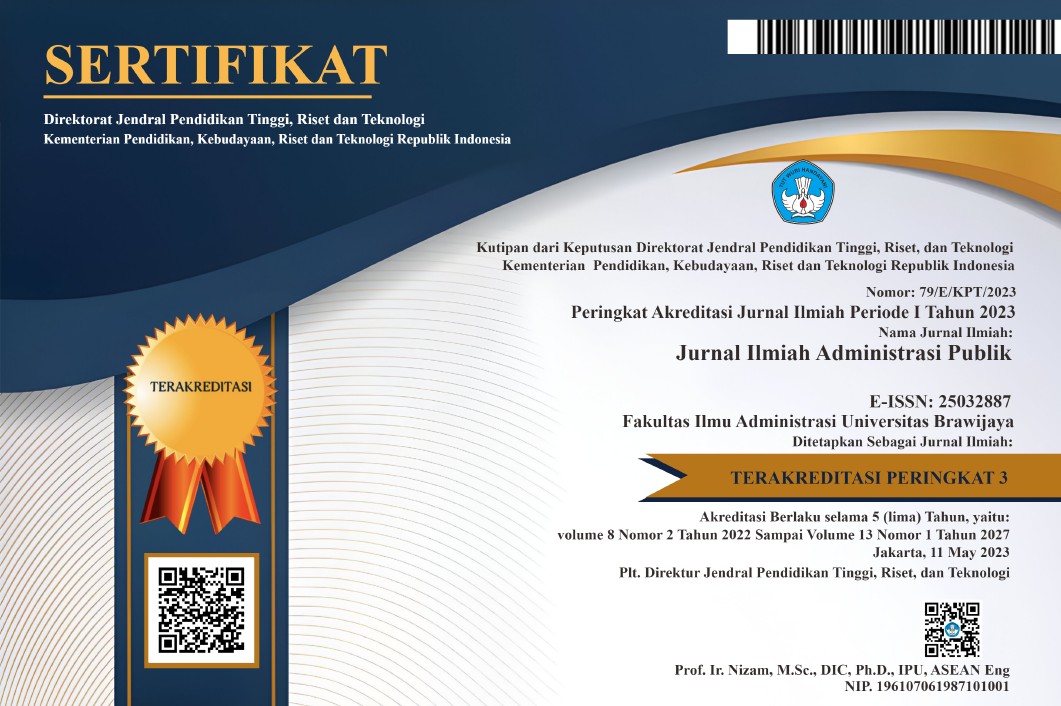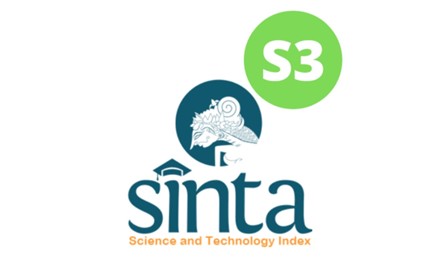Understanding Community Participation within Sustainable Rural Tourism Development (A Single Case Study in Kalibiru Village, Yogyakarta Special Region, Indonesia)
DOI:
https://doi.org/10.21776/ub.jiap.2018.004.04.4Keywords:
rural tourism, community participation, sustainable developmentAbstract
The development of rural tourism is estimated can led to a new dimension of sustainable development. The government of Indonesia has made some efforts to realize the target of increasing the country's foreign exchange income with digital tourism, rural tourism homestay, and air connectivity. Regarding this target, community participation is needed to become the main subject of rural tourism. However, the development of rural tourism in Indonesia still encounters various obstacles such as lack of promotion and innovation in programs. Using qualitative method, author explore the barriers, facilitators and how to overcome challenges within the sustainable rural tourism development in Kalibiru village, Yogyakarta Special Region, Indonesia.References
Akkawi, M. H. (2010). Resident Attitudes towards Tourism Development in Conservative Cultures: The Case of Qatar. University of Waterloo, Ontario, Canada.
Ap, J., & Crompton, J. L. (1993). Residents’ Strategies for Responding to Tourism Impacts. Journals of Travel Research, Vol. 33(1), pp.47-50.
Ap, J., & Crompton, J. L. (1998). Developing and testing a tourism impact scale. Journal of travel research, Vol. 37(2), pp.120-130.
Aref, F. and Redzuan, M. (2008). Barriers to Community Participation Toward Tourism Development in Shiraz, Iran. Pakistan Journal of Social Sciences, Vol. 5(9), pp.936-940.
Aref, F., & Gill, S. S. (2009). Rural tourism development through rural cooperatives. Nature and Science, Vol. 7(10), pp.68–73.
Blackstock, K. (2005). A Critical Look at Community-Based Tourism. Community Development Journal, Vol. 40(1), pp.39-49.
Bramwell, B., & Lane, B. (Eds.). (2000). Tourism collaboration and partnerships: Politics, practice and sustainability (Vol. 2). Channel View Publications, UK.
Bramwell, B. (2010). Participative Planning and Governance for Sustainable Tourism. Tourism Recreation Research, Vol. 35(3), pp.239–249.
Bramwell, B. (2011). Governance, the state and sustainable tourism: a political economy approach. Journal of Sustainable Tourism, Vol. 19(4–5), pp.459–477.
Briedenhann, J., & Wickens, E. (2004). Tourism routes as a tool for the economic development of rural areas? vibrant hope or impossible dream?. Tourism Management, Vol. 25(1), pp.71–79.
Brunt, P., & Courtney, P. (1999). Host Perceptions of Sociocultural Impacts. Annals of Tourism Research, Vol. 26(3), pp.493-515.
Dewi, M. H. U. (2013), Pengembangan desa wisata berbasis partisipasi masyarakat lokal di Desa Wisata Jatiluwih Tabanan, Bali. Jurnal Kawistara, Vol. 3(2), pp.31-40.
Dolnicar, S. (2006) Nature-conserving tourists: The need for a broader perspective. Anatolia: An International Journal of Tourism and Hospitality Research, Vol. 17(2), pp.235-255.
Dukeshire, S., & Thurlow, J. (2002). Challenges and barriers to community participation in policy development. Rural Communities Impacting Policy Project, Canada
Dunn, S. (2007). Toward empowerment: Women and community-based tourism in Thailand. Unpublished M.A. Thesis. University of Oregon, Oregon.
Ertuna, B., G. Kirbas (2012) Local community involvement in rural tourism development: The case of Kastamonu, Turkey. Revistade Turismoy Patrimonio Culture, Vol.10(2), pp.17-24
Fiorello, A., & Bo, D. (2012). Community-based ecotourism to meet the new tourist's expectations: An exploratory study. Journal of Hospitality Marketing & Management, Vol. 21(7), pp.758-778.
Fun, F. S., Chiun, L. M., Songan, P., & Nair, V. (2014). The Impact of Local Communities’ Involvement and Relationship Quality on Sustainable Rural Tourism in Rural Area, Sarawak. The Moderating Impact of Self-efficacy. Procedia - Social and Behavioral Sciences, 144, 60–65.
Hoda, N., Hoda, H., & Shehu, D. (2016). Natural Socio-Economic Environment and Sustainable Development of Rural Tourism: Case of Albanian Alps. Mediterranean Journal of Social Sciences, 7(5), pp.426-432
Kamarudin, K. H., Mohamed, B., &Bahauddin, A. (2013). Local stakeholder participation in developing sustainable community based rural tourism (CBRT): the case of three villages in the East Coast of Malaysia. In Proceedings of International Conference on Tourism Development, 'Building the future of tourism', Penang, Malaysia, 4-5 February 2013 (pp. 31-41). Sustainable Tourism Research Cluster.
Lankford, S. V. (1994). Attitudes and Perceptions towards Tourism and Rural Regional Development. Journal of Travel Research, Vol. 32(4), pp.35-43.
Lekaota, L. (2015). The importance of rural communities’ participation in the management of tourism management: A case study from Lesotho. Worldwide Hospitality and Tourism Themes, Vol. 7(5), pp.453–462.
Liu, Z. (2003). Sustainable Tourism Development: A Critique. Journal of Sustainable Tourism, Vol. 11(6), pp.459–475.
Local Regulation of Kulon Progo Regency No. 9, 2015, Rencana Induk Pembangunan Kepariwisataan Daerah Tahun 2015-2025 (RIPPDA)
Mason, P., & Cheyne, J. (2000). Residents’ Attitudes to Proposed Tourism Development. Annals of Tourism Research, Vol. 27, pp.391-411.
Ministry of Tourism. (2016). Kementerian Pariwisata: Ranking Devisa Pariwisata Terhadap 11 Ekspor Barang Terbesar, Tahun 2011-2015. Available at http://www.kemenpar.go.id/userfiles/devisa2011-2015.pdf [Accessed on 28th January, 2018]
Ministry of Tourism. (2017a). Laporan Akuntabilitas Kinerja Pemerintah (LAKIP)2017. Jakarta: Ministry of Tourism.
Ministry of Tourism. (2017b). Laporan Pengembangan Desa Wisata. Available at http://bumdes.id/wp-content/uploads/2018/01/Paparan-Pengembangan-Desa-Wisata-Kementerian-Pariwisata.pdf [Accessed on May 5th, 2018]
Murphy, P. E. (1985). Tourism: a community approach. New York: Methuen.
R. Scheyvens. (2002). Tourism for development: empowering communities. London: Prentice Hall.
Saufi, A., O’Brien, D., & Wilkins, H. (2014). Inhibitors to host community participation in sustainable tourism development in developing countries. Journal of Sustainable Tourism, Vol. 22(5), pp.801–820.
Sakata, H., &Prideaux, B. (2013). An alternative approach to community-based ecotourism: a bottom-up locally initiated non-monetised project in Papua New Guinea. Journal of Sustainable Tourism, Vol. 21(6), pp.880–899.
Salazar, N. B. (2012). Community-based cultural tourism: issues, threats and opportunities. Journal of Sustainable Tourism, Vol. 20(1), pp.9–22.
Timur, S., D. Getz.(2009) Sustainable tourism development: How do destination stakeholders perceive sustainable urban tourism?. Sustainable Development, Vol. 17(4), pp.220-232
Tosun, C. (2006). Expected nature of community participation in tourism development. Tourism Management, Vol. 27(3), pp.s493–504.
Widyasari & Haryanto, J. O. (2010). Analysis Effect of Environment Attitude, Health Consciousness and Knowledge in Developing Product Perception and Intention to Buy (A Case Study on Organic Food Product). Paper presented for SEAGA 2010, Hanoi 23 -26 Nov 2010.
Downloads
Published
Issue
Section
License
If your paper is accepted, the author identified as the formal corresponding author for the paper will receive an email prompting them to login into Author Services; where via the JIAP Author Licensing Service they will be able to complete the license agreement on behalf of all authors on the paper.














